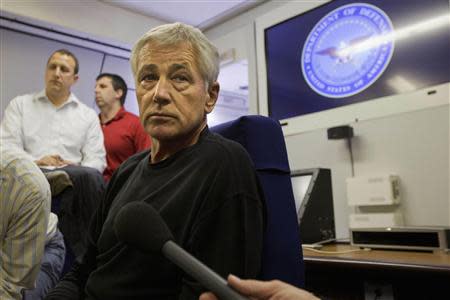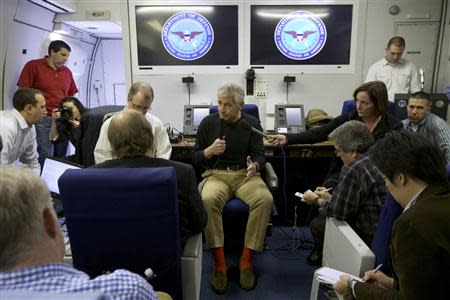Pentagon chief urges lawmakers to avert government shutdown
By David Alexander ABOARD A U.S. MILITARY AIRCRAFT (Reuters) - Defense Secretary Chuck Hagel appealed on Saturday for lawmakers to take action to avert a government shutdown next week, saying it was "astoundingly irresponsible" to try to influence policymaking by triggering a funding crisis. Hagel, speaking to reporters en route to Seoul to mark the 60th anniversary of the U.S.-South Korea defense alliance, said he had spent much of the week working on future spending cuts while planning for a shutdown next week that could force 400,000 civilian defense workers to take unpaid leave. For many of the civilians it would be the second time in as many months they have been forced to take unpaid leave. More than 600,000 civilian U.S. defense employees were required to take unpaid leave in early August in a bid to reduce spending after across-the-board budget cuts went into force in March. "When you look at the greatest democracy in the world, the largest economy in the world, and we're putting our people through this - that's not leadership, that's abdication of responsibilities," Hagel said. "This is an astoundingly irresponsible way to govern," he added, saying he hoped members of Congress would work to find "some common ground to govern and at least make the big decisions in the larger interest of this country." Funding for many U.S. government operations runs out next week with the start of the new fiscal year on October 1, and unless Congress reaches a deal to pay for its activities, much of the government will be forced to shut down. Only certain activities permitted under law are allowed to continue, officials said. The Republican-controlled House of Representatives is expected later on Saturday to vote on a bill to fund the U.S. government in the new fiscal year but with a delay on implementation of President Barack Obama's 2010 healthcare law. Senate Majority Leader Harry Reid, a Democrat, has said the Democratic-controlled Senate would not accept any funding measure aimed at derailing "Obamacare" and the White House has promised to veto the legislation if it passes Congress. Failure to pass a funding bill would close down much of the government for the first time since 1996. UNPAID LEAVE A contingency plan released by the Defense Department on Friday said the Pentagon's 1.4 million uniformed military personnel would continue to report to work in the event of a shutdown. But about half of the 800,000 civilian employees would be placed on unpaid leave. The plan said contractors working under fully funded agreements awarded before appropriations ran out would continue working, but new or extended contracts could not be executed. "No funds will be available to pay such new contracts or place additional increments of funding on contracts until Congress appropriates additional funds," the contingency plan said. Hagel said treatment of civilians under the law governing shutdowns was short-sighted because civilians provided much of the support structure for the military. "When you look at the defense of America, it isn't just the military," he said. "Our civilian employees, our civilian components, are integral parts of the defense and security of the United States. ... The entire support base for our military, the fighters, comes from the civilian community." Hagel's trip to Asia is the third since he took office at the end of February. It comes as Obama's administration shifts some of its strategic focus to the Asia-Pacific region following more than a decade of wars in Iraq and Afghanistan. While in Seoul, Hagel also will take part in consultative meetings on the future direction of the U.S.-South Korea security alliance and attend a change of command ceremony for U.S. forces in Korea. Army General Curtis Scaparrotti, the former director of the U.S. Joint Staff, will take over as commander of U.S. forces in Korea from Army General James Thurman. Army General Martin Dempsey, the chairman of the U.S. Joint Chiefs of Staff, and Admiral Samuel Locklear, the head of U.S. Pacific Command, also will be attending the meetings in Korea. After four days in South Korea, Hagel will travel to Tokyo where he and Secretary of State John Kerry will participate in so-called two-plus-two talks with their Japanese counterparts, the first time they have done so in Japan. "Especially at a time when the United States in particular is focused on internal domestic issues, beginning with the budget ... I think it's very, very important that we continue to assure our allies in this region of the world that we are committed to these alliances," Hagel said. (Reporting by David Alexander; Editing by Paul Simao)



